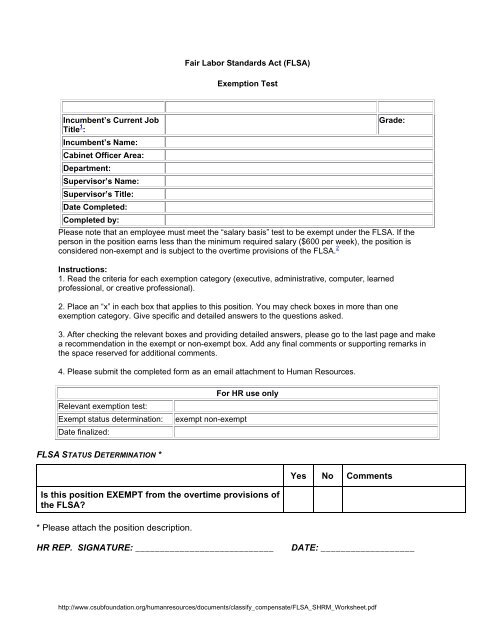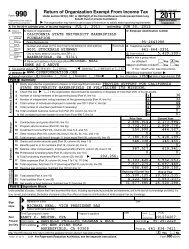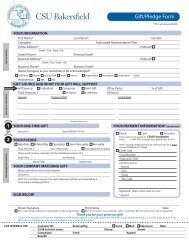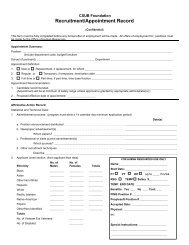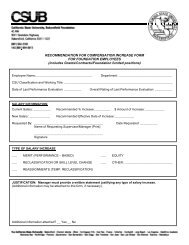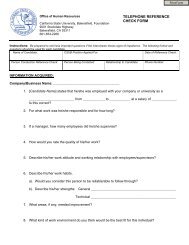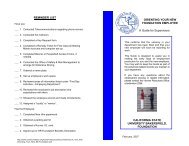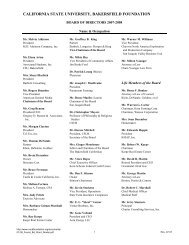FLSA - CSUB Foundation
FLSA - CSUB Foundation
FLSA - CSUB Foundation
You also want an ePaper? Increase the reach of your titles
YUMPU automatically turns print PDFs into web optimized ePapers that Google loves.
Fair Labor Standards Act (<strong>FLSA</strong>)<br />
Exemption Test<br />
Incumbent’s Current Job<br />
Title 1 :<br />
Incumbent’s Name:<br />
Cabinet Officer Area:<br />
Department:<br />
Supervisor’s Name:<br />
Supervisor’s Title:<br />
Date Completed:<br />
Completed by:<br />
Grade:<br />
Please note that an employee must meet the “salary basis” test to be exempt under the <strong>FLSA</strong>. If the<br />
person in the position earns less than the minimum required salary ($600 per week), the position is<br />
considered non-exempt and is subject to the overtime provisions of the <strong>FLSA</strong>. 2<br />
Instructions:<br />
1. Read the criteria for each exemption category (executive, administrative, computer, learned<br />
professional, or creative professional).<br />
2. Place an “x” in each box that applies to this position. You may check boxes in more than one<br />
exemption category. Give specific and detailed answers to the questions asked.<br />
3. After checking the relevant boxes and providing detailed answers, please go to the last page and make<br />
a recommendation in the exempt or non-exempt box. Add any final comments or supporting remarks in<br />
the space reserved for additional comments.<br />
4. Please submit the completed form as an email attachment to Human Resources.<br />
Relevant exemption test:<br />
Exempt status determination:<br />
Date finalized:<br />
exempt non-exempt<br />
For HR use only<br />
<strong>FLSA</strong> STATUS DETERMINATION *<br />
Yes No Comments<br />
Is this position EXEMPT from the overtime provisions of<br />
the <strong>FLSA</strong>?<br />
* Please attach the position description.<br />
HR REP. SIGNATURE: ____________________________<br />
DATE: ___________________<br />
http://www.csubfoundation.org/humanresources/documents/classify_compensate/<strong>FLSA</strong>_SHRM_Worksheet.pdf
Executive Employee Exemption<br />
Exempt executive employees generally are responsible for the success or failure of business operations<br />
under their management. Other critical elements are (1) whether management is the employee’s primary<br />
duty, (2) whether the employee directs the work of two or more full-time equivalent employees, and (3)<br />
whether the employee has the authority to hire/fire other employees or, alternatively, whether the<br />
employee’s suggestions and recommendations as to the hiring, firing, advancement, promotion or other<br />
change of status of other employees are given particular weight 3 .<br />
1. Is the employee compensated on a salary basis 4 at a rate not less<br />
than $600 per week?<br />
2. Does the employee’s “primary duty” consist of managing the<br />
enterprise or a customarily recognized department or division<br />
thereof? If yes, please describe:<br />
3. Does the incumbent regularly and customarily supervise two or<br />
more employees who are employed in the department or<br />
subdivision that the employee manages?<br />
Interview, select, and train employees? Coach employees in proper job<br />
performance techniques and procedures?<br />
Direct the work of employees and set/adjust their rates of pay and hours<br />
of work?<br />
Maintain records on employee productivity for use in supervision or<br />
control?<br />
Appraise employees’ productivity and efficiency to recommend<br />
promotions or other changes in status?<br />
Handle employee complaints and grievances and discipline employees<br />
when necessary?<br />
Plan other employees’ work and determine the techniques used in their<br />
work?<br />
Apportion work among different employees?<br />
Determine the types of materials, supplies, or tools to be used by other<br />
employees? Control the flow and distribution of materials and supplies?<br />
Provide for the safety of employees and the property of the employer?<br />
Control the budget? If yes, please explain:<br />
Monitor or implement legal compliance measures?<br />
3. Does the incumbent have shared responsibility for the<br />
supervision of the same employees in the same department? If yes,<br />
please describe:<br />
4. Does the incumbent have the authority to hire or fire other<br />
employees?<br />
If no, is it part of the incumbent’s job to make recommendations on<br />
hiring, firing, advancement, promotion, or other change of status?<br />
Are the incumbent’s recommendations frequently relied upon?<br />
4. What percent of working time does the incumbent spend<br />
providing the leadership duties and responsibilities described<br />
YES<br />
NO<br />
If no, stop. The<br />
employee is<br />
not exempt.<br />
If no, the<br />
employee is<br />
not exempt<br />
under this test.<br />
_______%<br />
http://www.csubfoundation.org/humanresources/documents/classify_compensate/<strong>FLSA</strong>_SHRM_Worksheet.pdf
above?<br />
5. List the employees whose work is customarily and regularly directed by the incumbent.<br />
Last Name<br />
Title<br />
Weekly work hours<br />
http://www.csubfoundation.org/humanresources/documents/classify_compensate/<strong>FLSA</strong>_SHRM_Worksheet.pdf
Administrative Employee Exemption<br />
The duties portion of the administrative exemption test establishes a two-part inquiry for determining<br />
whether an employee performs exempt administrative duties. First, what type of work is performed by the<br />
employee? Is the primary duty the performance of work directly related to management or general<br />
business operations? Second, what is the level or nature of the work performed? Does the employee’s<br />
primary duty include the exercise of discretion and independent judgment with respect to matters of<br />
significance? All of the relevant factors must be considered when determining whether an employee in an<br />
administrative position is exempt.<br />
2. Is the employee compensated on a salary basis at a rate not less<br />
than $600 per week?<br />
3. Please describe the incumbent’s “primary duty” 5 :<br />
Is this primary duty directly related to the management or general<br />
business operations of the university or its customers? 6<br />
3. Does the incumbent’s primary duty require the exercise of<br />
discretion and independent judgment 7 with respect to matters of<br />
significance? 8 If yes, does the employee:<br />
Have the authority to formulate, affect, interpret, or implement<br />
management policies or operating practices? If yes, please<br />
provide an example:<br />
Carry out major assignments in conducting the operations of the<br />
university?<br />
Perform work that affects business operations to a substantial<br />
degree?<br />
Have the authority to commit the university in matters that have<br />
significant financial impact? If yes, please provide an example:<br />
Have authority to waive or deviate from established policies and<br />
procedures without prior approval? If yes, please provide an<br />
example:<br />
Provide consultation or expert advice to management?<br />
Have authority to negotiate and bind the university on significant<br />
matters? If yes, please provide an example:<br />
Have involvement in planning long or short-term business<br />
objectives?<br />
Investigate and resolve matter of significance on behalf of<br />
management? If yes, please provide an example:<br />
Represent the university in handling complaints, arbitrating disputes or<br />
resolving grievances? If yes, please provide an example:<br />
YES<br />
NO<br />
If no, stop. The<br />
employee is<br />
not exempt.<br />
If no, the<br />
employee is<br />
not exempt<br />
under this test.<br />
If no, the<br />
employee is<br />
not exempt<br />
under this test.<br />
http://www.csubfoundation.org/humanresources/documents/classify_compensate/<strong>FLSA</strong>_SHRM_Worksheet.pdf
Computer Employee Exemption<br />
An employee who meets the consolidated duties test for computer professionals will be exempt if he or<br />
she meets either the salary or fee basis test or is paid at least $41.00 hourly. To qualify as an exempt<br />
computer employee, a worker must have a primary duty that consists of the four duties described under<br />
#3 below. The primary duty requirement applies both to salaried and hourly computer employees.<br />
1. Is the employee compensated on either a salary or fee basis at a rate<br />
not less than $600 per week, or if compensated on an hourly basis, at a<br />
rate not less than $41.00 per hour?<br />
2. Is the incumbent employed as a computer systems analyst, computer<br />
programmer, software engineer, or other similarly skilled worker in the<br />
computer field? 9 If yes, please describe the incumbent’s primary duty<br />
(see end note):<br />
3. Does the incumbent’s primary duty consist of:<br />
a) The application of systems analysis techniques and<br />
procedures, including consulting with users to determine<br />
hardware, software, or system functional specifications? If yes,<br />
please give an example:<br />
b) The design, development, documentation, analysis, creation,<br />
testing, or modification of computer systems or programs,<br />
including prototypes, based on and related to user or system<br />
design specifications? If yes, please give an example:<br />
c) The design, documentation, testing, creation, or modification<br />
of computer programs related to machine operating systems? If<br />
yes, please give an example:<br />
d) A combination of the aforementioned duties, the performance<br />
of which requires the same level of skills? If yes, please give an<br />
example:<br />
YES<br />
NO<br />
If no, stop. The<br />
employee is<br />
not exempt.<br />
If no, stop. The<br />
employee is<br />
not exempt<br />
under this test.<br />
http://www.csubfoundation.org/humanresources/documents/classify_compensate/<strong>FLSA</strong>_SHRM_Worksheet.pdf
Professional Employee Exemption<br />
The professional exemption actually encompasses two exemptions – one for “learned professionals” and<br />
one for “creative professionals.” To be an exempt “learned professional” an employee must have a<br />
primary duty that is the performance of work requiring knowledge of an advanced type – including the<br />
consistent exercise of discretion and judgment – in a field of science or learning where the advanced<br />
knowledge is acquired by a prolonged course of specialized intellectual instruction (examples include<br />
lawyers, doctors, architects, teachers, etc.). To meet the test for the creative professional exemption, an<br />
employee must have a primary duty that involves the performance of work requiring invention,<br />
imagination, originality or talent in a recognized field of artistic or creative endeavor (examples include<br />
actors, musicians, novelists, etc.).<br />
Learned Professional Employee<br />
1. Is the employee compensated on either a salary or fee basis at a rate<br />
not less than $600 per week?<br />
2. Please describe the incumbent’s “primary duty”:<br />
3. Does the incumbent’s primary duty involve the performance of work<br />
requiring advanced knowledge 10 in a field of science or learning that is<br />
customarily acquired by a prolonged course of specialized intellectual<br />
instruction 11 12 ?<br />
4. Is the incumbent’s primary duty predominantly intellectual in<br />
character? If yes, please describe:<br />
5. Does the incumbent’s primary duty require that his or her advanced<br />
knowledge be used to analyze, interpret, or make deductions from<br />
varying facts or circumstances? If yes, please give an example:<br />
6. Does the incumbent’s primary duty include the consistent exercise of<br />
discretion and judgment?<br />
Creative Professional Employee<br />
1. Is the employee compensated on either salary or fee basis at a rate<br />
not less than $600 per week?<br />
2. Please describe the incumbent’s “primary duty”:<br />
3. Does the incumbent’s primary duty involve the performance of work<br />
requiring invention, imagination, originality, or talent in a recognized field<br />
of artistic or creative endeavor 13 ?<br />
YES<br />
YES<br />
NO<br />
If no, stop. The<br />
employee is<br />
not exempt.<br />
NO<br />
If no, stop. The<br />
employee is<br />
not exempt.<br />
http://www.csubfoundation.org/humanresources/documents/classify_compensate/<strong>FLSA</strong>_SHRM_Worksheet.pdf
End Notes<br />
1 A job title alone is insufficient to establish the exempt status of an employee. Rather, the exempt or non-exempt<br />
status of any particular employee must be determined on the basis of whether the employee’s salary and duties meet<br />
the requirements of the regulations. It cannot be assumed that merely because one employee in a particular job<br />
classification is exempt, a second employee with a similar job title or even some of the same duties also is exempt.<br />
The decision must be made on a case-by-case basis.<br />
2<br />
The $600 minimum salary threshold for exempt workers is an absolute requirement, no matter whether the<br />
employee is full-time or part-time. Prorating the minimum salary figure ($600 per week) is not permitted for part-time<br />
employees or in job-sharing situations. In other words, a half-time employee who earns $400/week does not meet the<br />
salary basis test, even though the employee would earn $800/week were s/he to work full-time.<br />
3<br />
To determine whether an employee’s suggestions and recommendations are given “particular weight,” factors to<br />
be considered include, but are not limited to, whether it is part of the employee’s job duties to make such suggestions<br />
and recommendations; the frequency with which such suggestions and recommendations are made or requested;<br />
and the frequency with which the employee’s suggestions and recommendations are relied upon.<br />
4<br />
“Salary basis” means that the employee receives a pre-determined amount of compensation each pay period on a<br />
non-fluctuating basis. This predetermined amount cannot be reduced because of variations in the quality or quantity<br />
of the employee’s work.<br />
5<br />
“Primary duty” means the principal, main, major, or most important duty that the employee performs.<br />
Determination of an employee’s primary duty must be based on all the facts in a particular case, with the major<br />
emphasis on the character of the employee’s job as a whole. Factors to consider when determining the primary duty<br />
of an employee include, but are not limited to, the relative importance of the exempt duties as compared with other<br />
types of duties; the amount of time spent performing exempt work; the employee’s relative freedom from direct<br />
supervision; and the relationship between the employee’s salary and the wages paid to other employees for the kind<br />
of non-exempt work performed by the employee.<br />
6<br />
“Directly related to management or general business operations” refers to the type of work performed by the<br />
employee. In order to support the administrative exemption, the work must be related directly to the running or<br />
servicing of the university, as distinguished, for example, from working on a production line, selling in a retail<br />
establishment, etc. Types of work considered “directly related” include finance, purchasing, marketing, research,<br />
compliance, safety and health, human resources, etc.<br />
7<br />
The exercise of discretion and judgment involves the comparison and evaluation of possible courses of conduct<br />
and acting or making a decision after the various possibilities have been considered. The term must be applied in the<br />
light of all the facts involved in the employee’s particular employment situation, and implies that the employee has<br />
authority to make an independent choice, free from immediate direction or supervision. The fact that an employee’s<br />
decisions may be revised or reversed after review does not mean that the employee is not exercising discretion and<br />
independent judgment. In addition, exempt employees may use manuals, guidelines or other established procedures<br />
if they contain highly technical, scientific, legal, financial or other similarly complex matters that can be understood or<br />
interpreted only by those with advanced or specialized knowledge or skills.<br />
Discretion and independent judgment does not include following prescribed procedures or determining which<br />
procedures to follow, determining whether specified standards have been satisfied (even if there is some leeway), or<br />
applying established techniques or standards described in manuals or other sources to determine the correct<br />
response to an inquiry or set of circumstances. It also does not include clerical or secretarial work, recording or<br />
tabulating data, or performing mechanical, repetitive, recurrent or routine work. For example, an employee who<br />
enters, compiles, records, maintains, or tabulates data is not exempt as an administrative employee, even if they are<br />
called a “statistician”.<br />
8<br />
The term “matters of significance” refers to the level of importance or consequence of the work performed. An<br />
employee does not exercise discretion and independent judgment with respect to matters of significance merely<br />
because the employer will experience financial losses if the employee fails to perform the job properly. Similarly, an<br />
employee who operates very expensive equipment does not exercise discretion and independent judgment with<br />
respect to matters of significance merely because improper performance may cause serious financial loss.<br />
9<br />
The computer exemption does not include employees engaged in the manufacture or repair of computer hardware<br />
and related equipment. Employees whose work is highly dependent upon, or facilitated by, the use of computers and<br />
computer software programs (e.g., engineers, drafters, and others skilled in computer-aided design software) but who<br />
are not primarily engaged in computer systems analysis and programming or other similarly skilled computer-related<br />
exempt work are not exempt under the computer employee exemption (they may, however, be exempt under another<br />
category).<br />
10<br />
Learned professional work is distinguished from work involving routine mental, manual, mechanical or physical<br />
work. A learned professional employee uses advanced knowledge to analyze, interpret or make deductions from<br />
varying facts or circumstances. Advanced knowledge cannot be attained at the high school level. An employee<br />
cannot be exempt as a learned professional unless the work requires knowledge of an advanced type. For example,<br />
it is not uncommon for someone trained as a lawyer to work as a paralegal while waiting to pass the bar exam. In<br />
such a case, the employee would not qualify for the exemption.<br />
http://www.csubfoundation.org/humanresources/documents/classify_compensate/<strong>FLSA</strong>_SHRM_Worksheet.pdf
When an employee spends less than the majority of his/her time pursuing the profession, the learned professional<br />
exemption may still be met, depending on the relative importance of the professional duties as opposed to the other<br />
types of duties, the frequency with which the employee exercises discretionary powers, the employee’s relative<br />
freedom from supervision and the relationship between the employee’s salary and the wages paid to other<br />
employees who perform the same kind of non-exempt work.<br />
11<br />
Fields of science or learning include law, medicine, theology, actuarial computation, engineering, architecture,<br />
teaching, various types of physical, chemical and biological sciences, pharmacy and other occupations that have a<br />
recognized professional status and are distinguishable from the mechanical arts or skilled trades where the<br />
knowledge could be of a fairly advanced type, but is not in a field of science or learning.<br />
12<br />
The learned professional exemption is restricted to professions where specialized academic training is a<br />
standard prerequisite for entrance into the profession (e.g., an Engineering degree is required to be a Facilities<br />
Construction Engineer). However, the word “customarily” means the exemption may be available to employees in<br />
such professions who have substantially the same knowledge level and perform substantially the same work as the<br />
degreed employees, but who attained the advanced knowledge through a combination of work experience and<br />
intellectual instruction.<br />
The learned professional exemption does not apply to occupations in which employees acquire their skill by<br />
experience rather than by advanced specialized intellectual instruction. The learned professional exemption is not<br />
available for occupations that may be performed with only the general knowledge acquired by an academic degree in<br />
any field, knowledge acquired through an apprenticeship, or training in the performance of routine mental, manual,<br />
mechanical or physical processes. The exemption also does not apply to occupations in which employees acquire<br />
skill by experience.<br />
13<br />
For the creative professional exemption, work performed must be “in a recognized field of artistic or creative<br />
endeavor” including such fields as music, writing, acting, graphic design, etc. The creative professional exemption<br />
generally is not met by a person employed as a copyist, graphic arts technician, animator, or retoucher of<br />
photographs since such work is not properly described as creative in character.<br />
http://www.csubfoundation.org/humanresources/documents/classify_compensate/<strong>FLSA</strong>_SHRM_Worksheet.pdf


